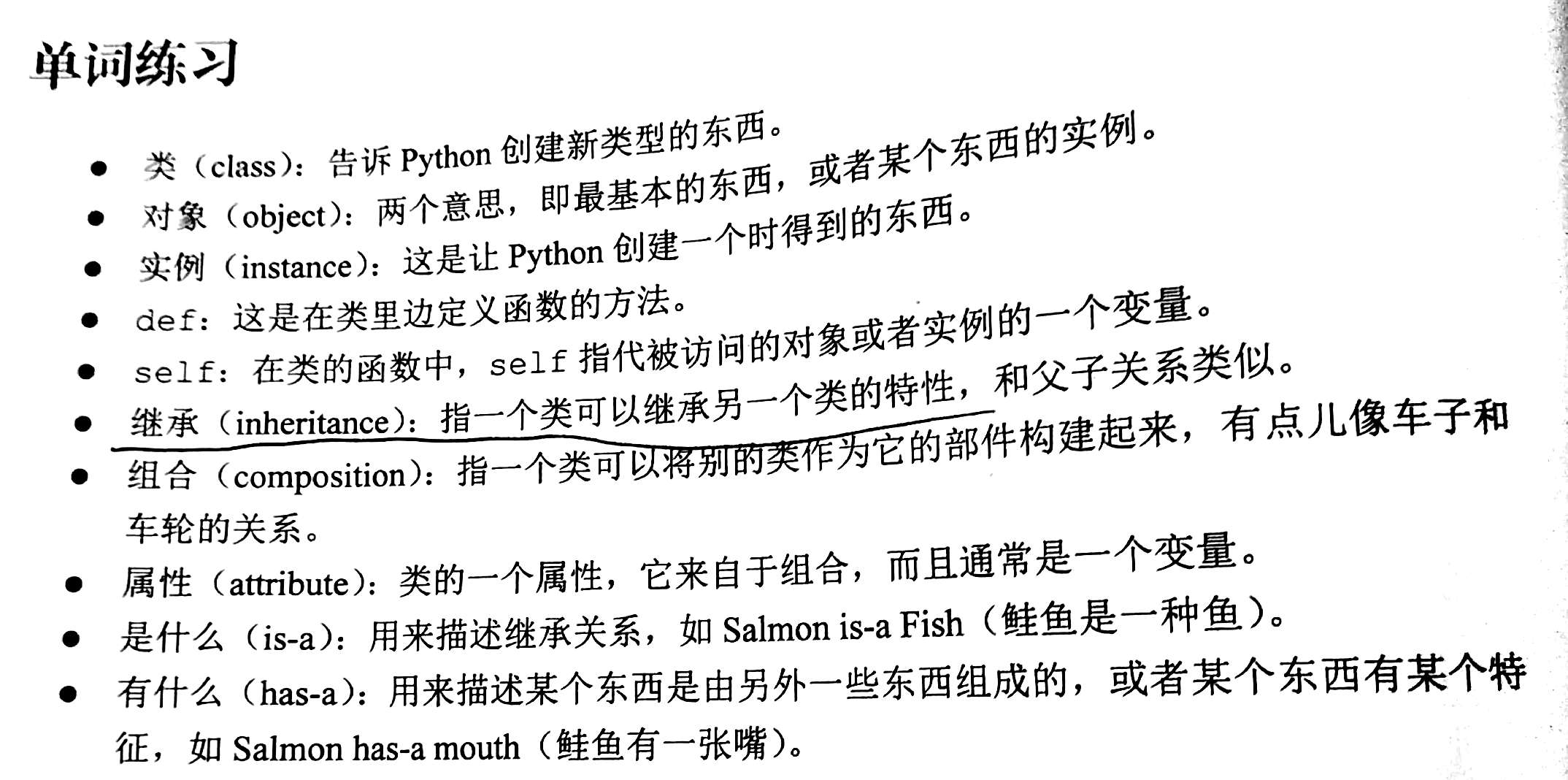习题 40:模块、类和对象
模块是包含函数和变量的 Python 文件,可以导入这个文件,可以使用 "." 操作符访问模块中的函数和变量。
模块还可以用一种方法去理解:可以把它们当做一种特殊的字典,通过它们可以存储一些 Python 代码,可以通过 "." 操作符访问这些代码。Python 还有一种另外一种代码结构用来实现类似的目的,那就是类,通过类,你可以把一组函数和数据放到一个容器中,从而用 "." 操作符访问类中的函数和变量。
使用类而非模块的原因:其重复创建很多出来(类可以多次实例化),这些实例之间也不会相互干涉;而模块一次导入之后,整个程序中只有这么一份内容
对象相当于迷你导入

现在有三种方法可以从某个东西里获取东西:
# dict sytle mystuff['apples'] # module style 调用模块 mystuff.apples() # 访问模块的函数 mystuff.tangerine # 访问模块的变量 # class style thing = MyStuff() 调用类 thing.apples() # 访问类的函数 thing.tangerine # 访问类的变量
class Song: def __init__(self, lyrics): self.lyrics = lyrics def sing_me_a_song(self): for line in self.lyrics: print(line) happy_bday = Song(["Happy birthday to you", # 调用类 "I don't want to get sued", "So I'll stop right there"]) bulls_on_parade = Song(["There rally around the family", "With pockets full of shells"]) happy_bday.sing_me_a_song() bulls_on_parade.sing_me_a_song()
创建 __init__ 或者别的类函数时需要多加一个 self 变量。

习题 41:学习面向对象术语
1 import random 2 from urllib.request import urlopen 3 import sys 4 5 WORD_URL = "http://learncodethehardway.org/words.txt" 6 WORDS = [] 7 8 PHRASES = { 9 "class %%%(%%%):": 10 "Make a class named %%% that is-a %%%.", 11 "class %%%(object): def __init__(self, ***)" : 12 "class %%% has-a __init__ that takes self and *** params.", 13 "class %%%(object): def ***(self, @@@)" : 14 "class %%% has-a function *** that takes self and @@@ params.", 15 "*** = %%%()": 16 "Set *** to an instance of class %%%.", 17 "***.***(@@@)": 18 "From *** get the *** function, call it with params self, @@@.", 19 "***.*** = '***'": 20 "From *** get the *** attribute and set it to '***'." 21 } 22 23 # do they want to drill phrases first 24 if len(sys.argv) == 2 and sys.argv[1] == "english": 25 PHRASE_FIRST = True 26 else: 27 PHRASE_FIRST = False 28 29 # load up the words from the website 30 for word in urlopen(WORD_URL).readlines(): 31 WORDS.append(str(word.strip(), encoding = "utf-8")) 32 33 def convert(snippet, phrase): 34 class_names = [w.capitalize() for w in 35 random.sample(WORDS, snippet.count("%%%"))] 36 other_names = random.sample(WORDS, snippet.count("%%%")) 37 results = [] 38 param_names = [] 39 40 for i in range(0, snippet.count("@@@")): 41 param_count = random.randint(1,3) 42 param_names.append(','.join( 43 random.sample(WORDS, param_count))) 44 45 for sentence in snippet, phrase: 46 result = sentence[:] 47 48 #fake class names 49 for word in class_names: 50 result = result.replace("%%%", word, 1) 51 #fake other names 52 for word in other_names: 53 result = result.replace("***", word, 1) 54 #fake parameter names 55 for word in param_names: 56 result = result.replace("@@@", word, 1) 57 58 results.append(result) 59 return results 60 61 # keep going until they hit CTRL-D 62 try: 63 while True: 64 snippets = list(PHRASES.keys()) 65 random.shuffle(snippets) 66 67 for snippet in snippets: 68 phrase = PHRASES[snippet] 69 question, answer = convert(snippet, phrase) 70 if PHRASE_FIRST: 71 question, answer = answer, question 72 73 print(question) 74 75 input("> ") 76 print(f"ANSWER: {answer} ") 77 78 except EOFError: 79 print(" Bye") 80 81 result = sentence[:] 82 print(result)
习题 42:对象、类及从属关系
1 ## Animal is-a object (yes, sort of confusing) look at the extra credit 2 class Animal(object): 3 pass 4 5 ## Dog is-a Animal 6 class Dog(Animal): 7 8 def __init__(self, name): 9 ## ?? 10 self.name = name 11 12 ## Cat is-a Animal 13 class Cat(Animal): 14 15 def __init__(self, name): 16 ## ?? 17 self.name = name 18 19 ## Person is-a Animal 20 class Person(Animal): 21 22 def __init__(self, name): 23 ## ?? 24 self.name = name 25 26 ## Person has-a pet of some kind 27 self.pet = None 28 29 ## Employee is-a Person 30 class Employee(Person): 31 32 def __init__(self, name, salary): 33 ## ?? hmm what is this strange magic? 34 super(Employee, self).__init__(name) 35 ## ?? 36 self.salary =salary 37 38 ## Fish is-a object 39 class Fish(object): 40 pass 41 42 ## Salmon is-a Fish 43 class Salmon(Fish): 44 pass 45 46 ## Halibut is-a Fish 47 class Halibut(Fish): 48 pass 49 50 ## rover is-a dog 51 rover = Dog("Rover") 52 53 ## satan is-a Cat 54 satan = Cat("Satan") 55 56 ## mary is-a Person 57 mary = Person("Mary") 58 59 ## mary has-a pet, satan is-a Cat 60 mary.pet = satan 61 62 ## ?? 63 frank = Employee("Frank", 12000) 64 65 ## ?? 66 frank.pet =rover 67 68 ## ?? 69 flipper =Fish() 70 71 ## ?? 72 crouse = Salmon() 73 74 ## ?? 75 harry = Halibut()
习题41涉及到的函数
https://www.runoob.com/python/python-func-str.html
https://www.runoob.com/python3/python3-string-strip.html
https://www.runoob.com/python3/python3-func-number-random.html
https://www.runoob.com/python3/python3-random-number.html
https://www.runoob.com/python/python-exercise-example94.html
https://www.runoob.com/python3/python3-string-capitalize.html
https://www.runoob.com/python3/python3-att-dictionary-keys.html
https://www.runoob.com/python3/python3-string-count.html
https://www.runoob.com/python3/python-copy-list.html
https://www.runoob.com/python3/python3-string-replace.html
https://www.runoob.com/python3/python3-func-number-shuffle.html
